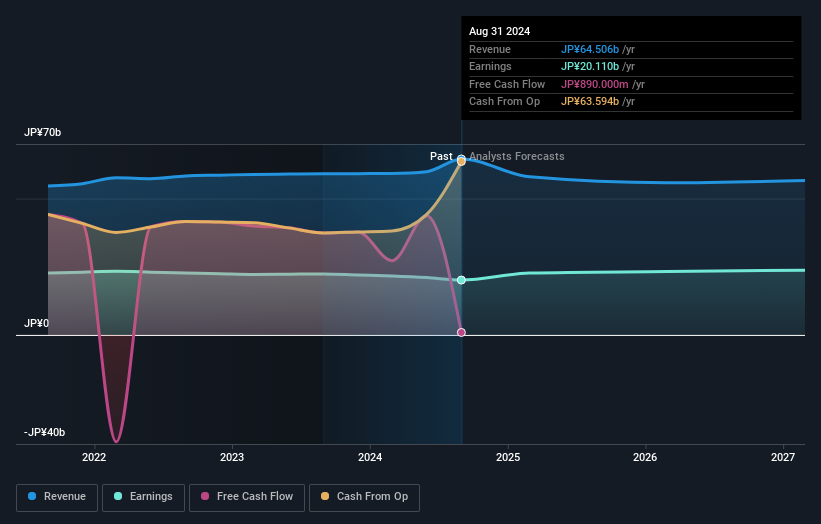With 65% institutional ownership, Daiwa House REIT Investment Corporation (TSE:8984) is a favorite amongst the big guns

Key Insights
- Given the large stake in the stock by institutions, Daiwa House REIT Investment's stock price might be vulnerable to their trading decisions
- 50% of the business is held by the top 15 shareholders
- Using data from analyst forecasts alongside ownership research, one can better assess the future performance of a company
If you want to know who really controls Daiwa House REIT Investment Corporation (TSE:8984), then you'll have to look at the makeup of its share registry. We can see that institutions own the lion's share in the company with 65% ownership. In other words, the group stands to gain the most (or lose the most) from their investment into the company.
Because institutional owners have a huge pool of resources and liquidity, their investing decisions tend to carry a great deal of weight, especially with individual investors. Therefore, a good portion of institutional money invested in the company is usually a huge vote of confidence on its future.
Let's delve deeper into each type of owner of Daiwa House REIT Investment, beginning with the chart below.
See our latest analysis for Daiwa House REIT Investment

What Does The Institutional Ownership Tell Us About Daiwa House REIT Investment?
Many institutions measure their performance against an index that approximates the local market. So they usually pay more attention to companies that are included in major indices.
We can see that Daiwa House REIT Investment does have institutional investors; and they hold a good portion of the company's stock. This suggests some credibility amongst professional investors. But we can't rely on that fact alone since institutions make bad investments sometimes, just like everyone does. It is not uncommon to see a big share price drop if two large institutional investors try to sell out of a stock at the same time. So it is worth checking the past earnings trajectory of Daiwa House REIT Investment, (below). Of course, keep in mind that there are other factors to consider, too.

Investors should note that institutions actually own more than half the company, so they can collectively wield significant power. We note that hedge funds don't have a meaningful investment in Daiwa House REIT Investment. BlackRock, Inc. is currently the company's largest shareholder with 6.6% of shares outstanding. Meanwhile, the second and third largest shareholders, hold 5.3% and 5.1%, of the shares outstanding, respectively.
A closer look at our ownership figures suggests that the top 15 shareholders have a combined ownership of 50% implying that no single shareholder has a majority.
While it makes sense to study institutional ownership data for a company, it also makes sense to study analyst sentiments to know which way the wind is blowing. There are plenty of analysts covering the stock, so it might be worth seeing what they are forecasting, too.
Insider Ownership Of Daiwa House REIT Investment
The definition of an insider can differ slightly between different countries, but members of the board of directors always count. The company management answer to the board and the latter should represent the interests of shareholders. Notably, sometimes top-level managers are on the board themselves.
I generally consider insider ownership to be a good thing. However, on some occasions it makes it more difficult for other shareholders to hold the board accountable for decisions.
Our data cannot confirm that board members are holding shares personally. It is unusual not to have at least some personal holdings by board members, so our data might be flawed. A good next step would be to check how much the CEO is paid.
General Public Ownership
The general public-- including retail investors -- own 31% stake in the company, and hence can't easily be ignored. This size of ownership, while considerable, may not be enough to change company policy if the decision is not in sync with other large shareholders.
Public Company Ownership
We can see that public companies hold 4.0% of the Daiwa House REIT Investment shares on issue. We can't be certain but it is quite possible this is a strategic stake. The businesses may be similar, or work together.
Next Steps:
I find it very interesting to look at who exactly owns a company. But to truly gain insight, we need to consider other information, too. Take risks for example - Daiwa House REIT Investment has 2 warning signs (and 1 which makes us a bit uncomfortable) we think you should know about.
If you would prefer discover what analysts are predicting in terms of future growth, do not miss this free report on analyst forecasts.
NB: Figures in this article are calculated using data from the last twelve months, which refer to the 12-month period ending on the last date of the month the financial statement is dated. This may not be consistent with full year annual report figures.
New: Manage All Your Stock Portfolios in One Place
We've created the ultimate portfolio companion for stock investors, and it's free.
• Connect an unlimited number of Portfolios and see your total in one currency
• Be alerted to new Warning Signs or Risks via email or mobile
• Track the Fair Value of your stocks
Have feedback on this article? Concerned about the content? Get in touch with us directly. Alternatively, email editorial-team (at) simplywallst.com.
This article by Simply Wall St is general in nature. We provide commentary based on historical data and analyst forecasts only using an unbiased methodology and our articles are not intended to be financial advice. It does not constitute a recommendation to buy or sell any stock, and does not take account of your objectives, or your financial situation. We aim to bring you long-term focused analysis driven by fundamental data. Note that our analysis may not factor in the latest price-sensitive company announcements or qualitative material. Simply Wall St has no position in any stocks mentioned.
About TSE:8984
Daiwa House REIT Investment
Our investment strategy is to target a diversified portfolio, focusing on logistics, residential, retail and hotel properties as our core asset classes, as well as other asset classes such as office buildings and healthcare properties.
Established dividend payer and slightly overvalued.


